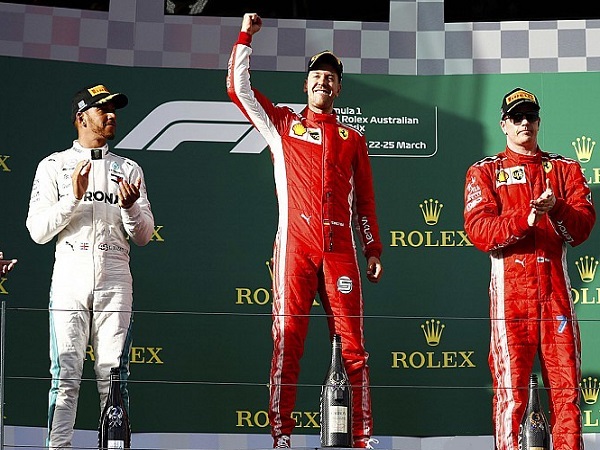The four-time world champion also agrees that the human side is losing out at a time when teams and drivers are thriving for perfection.
"I think that losing it is no longer excused these days. What used to be normal and is retroactively considered cultic - such as footballers who lost their cool after a match - is not normal any more today," Vettel said.
"Emotions, that's what losing your temper is about, can be good when you win and are happy on the podium. But there are also bad ones when everything goes the wrong way."
Vettel knows from experience, as incidents include him insulting Red Bull's Max Verstappen and race director Charlie Whiting at the 2016 race in Mexico, and deliberately driving into the Mercedes of title rival Lewis Hamilton at last year's Azerbaijan Grand Prix when he believed the Briton had brake-tested him.
"I had to answer questions whether I couldn't control my aggression and temper and whether I required therapy," Vettel said in reference to the Hamilton incident.
"Was it right? No it was wrong. It was a mistake of mine. Did I gain anything from it? No, I shot myself in the foot because otherwise I would have won the race. So I drew my conclusions."
But he also said there is a thin line between showing too much emotion and none at all, which could eventually possibly even harm the sport.
"Many things with us or in other sports happen intuitively. And that is good. If everything came from the brain and the computer the human element would be lacking. Then it would be boring," Vettel said.
Vettel said Formula One is "a little over-regulated" but not the only sport which is undergoing changes in this area, with money the main reason.
"The reason is clear, it is about lots of money. You want to make the sport fair and give everyone a chance. But certain things are not black and white, you need tolerance and understanding," he said
All statements and actions of Vettel and the other drivers in and out of their cars are highlighted as no outburst goes unnoticed.
But the 30-year-old appears calmer this season after a decade in the sport, with Ferrari team principal Maurizio Arrivabene also telling him to be a little more relaxed in his pursuit of a first world title with Ferrari.
"I have been around for a while, and at this level. It is normal that there are always situations which upset you more than others. But I believe you learn how to deal with certain things. You know you can't change them," Vettel said.
"I think that losing it is no longer excused these days. What used to be normal and is retroactively considered cultic - such as footballers who lost their cool after a match - is not normal any more today," Vettel said.
"Emotions, that's what losing your temper is about, can be good when you win and are happy on the podium. But there are also bad ones when everything goes the wrong way."
Vettel knows from experience, as incidents include him insulting Red Bull's Max Verstappen and race director Charlie Whiting at the 2016 race in Mexico, and deliberately driving into the Mercedes of title rival Lewis Hamilton at last year's Azerbaijan Grand Prix when he believed the Briton had brake-tested him.
"I had to answer questions whether I couldn't control my aggression and temper and whether I required therapy," Vettel said in reference to the Hamilton incident.
"Was it right? No it was wrong. It was a mistake of mine. Did I gain anything from it? No, I shot myself in the foot because otherwise I would have won the race. So I drew my conclusions."
But he also said there is a thin line between showing too much emotion and none at all, which could eventually possibly even harm the sport.
"Many things with us or in other sports happen intuitively. And that is good. If everything came from the brain and the computer the human element would be lacking. Then it would be boring," Vettel said.
Vettel said Formula One is "a little over-regulated" but not the only sport which is undergoing changes in this area, with money the main reason.
"The reason is clear, it is about lots of money. You want to make the sport fair and give everyone a chance. But certain things are not black and white, you need tolerance and understanding," he said
All statements and actions of Vettel and the other drivers in and out of their cars are highlighted as no outburst goes unnoticed.
But the 30-year-old appears calmer this season after a decade in the sport, with Ferrari team principal Maurizio Arrivabene also telling him to be a little more relaxed in his pursuit of a first world title with Ferrari.
"I have been around for a while, and at this level. It is normal that there are always situations which upset you more than others. But I believe you learn how to deal with certain things. You know you can't change them," Vettel said.









 Home
Home Politics
Politics











